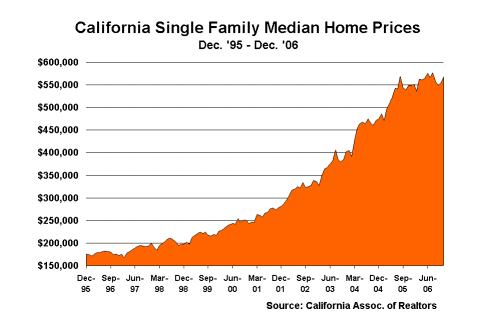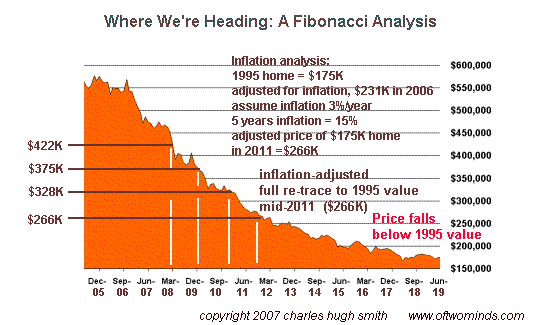Is Buying a House Catching a Falling Knife or a Practically Foolproof Inflation Hedge?
Astute reader Peter B. poses four scenarios which suggest buying a house now may have limited downside. Astute reader Peter B. recently offered a "devil's advocate" case for buying a house now at popped-bubble prices. As he put it, Is Buying a House Catching a Falling Knife or a Practically Foolproof Inflation Hedge? It's an important question, for while it is easy to say "just wait for the bottom in 2014" not everyone is willing to wait that long. Children are born and parents want to have their own home even if prices continue down, etc. Here's Peter's commentary: Here’s how it might play out. You put 10% down and take out a 30 year loan at 5%. A $200,000 dollar home would cost you $20,000 down, $1000 a month P&I, $100 a month PMI and say $500 a month in taxes and other costs $1600 a month, about the same as it would cost to rent a similar house. Now four things can happen in the order of predictability: 1. The world doesn’t come to an end. Housing drifts down for the next down for the next few years then stagnates for ten. You missed the bottom, but have the pleasure of home ownership, don’t lay awake regretting your purchase or agonizing whether to buy or rent. 2. Inflation reaches 100% or more over some period of time. Home prices keep up with inflation as folks seek safe harbor in tangible assets. Your home is still worth $220,000 in 2009 dollars but $440,000 in 2015 dollars, you come out ahead by having an inflation hedge and paying off your loan $.50 on the dollar. 3. Inflation reaches 100% or more over some period of time. Rising interest rates and demographics keeps house prices more or less level, your house is still worth $220,000 in 2015 dollars but only $110,000 in 2009 dollars, you break even by paying that off in 2015 dollars. 4. Throwing the bankers and other assorted capitalists under the bus, the government lets the depression play out. Everything unwinds. Deflation ensues; your house is now worth $110,000 in cold hard cash. You walk away and buying a similar house for cash or obtain a loan under some program where people who were caught in the "housing crisis of 2010" get a pass. Sure you lose your 20 grand, but that’s almost exactly what you’d pay in rent for a year. Thank you, Peter, for a thought-provoking argument for buying. I especially like the tongue-in-cheek reference to the bailout of those caught by the housing crisis of 2010.... Unfortunately, we can expect just such bailouts of lenders and borrowers until no one is willing to loan the Federal government or its various agencies another few trillion dollars to squander on risky debt. In the spirit of devil's advocacy, here are my comments on these plausible scenarios. First, let's grant that ownership does have potentially significant rewards--not necessarily financial. If you own a piece of land, then you can plant what you want on it, and build what you want (unless you live in a subdivision ruled by Covenants and Restrictions, of course). You don't have to worry about getting evicted if a landlord goes broke. If you can afford the home or own it free and clear, it's yours, and there is a unique sense of security in that ownership. If you have a fixed rate mortgage, then you also know how much your monthly "nut" will be, and you won't get any surprise rent increases. On the other side of the ledger, if foreclosures keep inventories of "homes for sale" high, then a house can be a capital trap, i.e. an illiquid asset you can't sell to extract your capital. Practically speaking, that means you can't move to another locale for a better job (or job, period) because you can't sell your house. That's a potentially severe limitation in a mobile society. Financially, the costs of ownership vs. renting are complex and not readily generalized. Whenever I comment on this topic, I receive a blizzard of pursuasive arguments: did I calculate the benefits of the mortgage interest deduction, depreciation, etc.? If you're blessed with a left-coast sized mortgage with $4,000/month in interest and you have one child, then that $50K/year in deductions certainly impacts your tax bill. But if you have a household of four and mortgage interest of $18,000/year and no other significant deductions, then you're better off taking the standard deductions--so the mortgage interest deduction is essentially worthless. A lot of folks enamoured of straightline financial calculations often forget that a house is a living, decaying structure which can cost a lot of money to maintain. Such costs are not easily predicted, though they are easily underestimated. They also tend to forget that condo association fees are often high to start with and only move higher as the usual litany of structural problems and multiple lawsuits (filed just before expiration, natch) jack up association dues. We can also anticipate that revenue-starved municipalities will start raising property taxes unless Prop-13-type laws are in place to restrict such increases. I would be wary of buying property in any state without strict caps on property tax increases, for the simple reason that the local governments will inevitably turn to the taxpayers who can't leave or close down--property owners--to cover their revenue shortfalls. There is a tendency when making the "rent vs buy" calculations to form a bias which skews the calculations. Thus if you've already decided to buy, then your estimates for repairs and maintenance might be very light, as a way of justifying the "low cost of ownership." Other readers have pointed out that the low interest rates now available somewhat offset the probable declines in home values which lie ahead. In other words, if interest rates rise 20% in the near future (as I expect), then buying now at low rates is roughly equivalent to buying the same house few years from now for 20% less than today's price. That is certainly a valid point for anyone planning to carry a 80% LTV (loan to value) mortgage. But will housing decline "only" 20% in your area? If prices drop 40%, then waiting still makes financial sense. How can anyone tell how much more decline may be in the works? There is no sure way, of course, but we can use "reversion to the mean" as a rough guide. All bubbles tend to revert to their starting point. Thus we can expect housing to fall back to the vicinity of its value (adjusted modestly for the decade's low inflation) in the late 1990s before the bubble mania took hold. If housing has nearly completed the "round trip" back to pre-bubble valuations, then buying now at low interest rates in anticipation of higher rates makes financial sense. If local housing has only completed half the "round trip" back to pre-bubble prices, then caution may well be warranted. That $600K house looks like a "bargain" at $375K only if you don't anticipate it being $250K next year. As for inflation: let's consider two charts I made way back in 2007: Here's the symmetrical decline I anticipated, adjusted for inflation: I think Peter is absolutely correct to anticipate inflation as one probably scenario; after all, printing and borrowing trillions of dollars and then unleashing that torrent into the U.S. economy (let's throw risk management to the winds once again and hope it turns out wonderfully this time!) has a good chance of sparking inflation. On the other hand, if the Depression sees the loss of 30 million jobs then the ability of people to buy homes will be severely constrained--and Peter's deflation scenario comes into play. Bottom line: it's impossible to accurately predict which scenario plays out.We might well get a "hybrid scenario" few expect in which the cost (in dollars) of FEW resources (food, energy, water) rise due to shortages and a severe decline in the dollar while at the same time debt-dependent assets like real estate continue deflating as the cost of borrowing skyrockets along with unemployment. And while I appreciate the humor in Peter's last paragraph, it makes a very serious point: moral hazard has been impaired by the Fed and Treasury bailouts. No doubt the idea that the government will bail out future risky plays and loans which go bad is rattling around in a lot of feverish brains. As for the "walk away" scenario: in a Depression, replacing the capital lost by walking away may not be easily replaced. "Walking away" from a 3% down FHA loan is one thing but walking away from 20% down is another. Bottom line: housing is completely and utterly dependent on two factors: employment and low-cost abundant money. If jobs vanish and money dries up/becomes expensive (for a variety of reasons covered here before) then the value of housing could easily fall well below the prices fetched in the go-go decade of the 1990s. It's worth recalling that the 25-year rise in housing corresponds with the 1982-2007 Bull market and borrowing frenzy (Federal, commercial and household) and the progression of the massive Baby Boom generation from college kids to home buyers. Now, those 60 million Boomers are proceeding to empty nesters/newly impoverished people facing the future with fewer assets than expected. It doesn't take much to anticipate an imbalance in which there are more sellers than buyers for years to come. As these generational trends reverse, then to expect housing to act as it did in the previous 25 years is unrealistic. Housing may act as a hedge against inflation as it did in the 1970s; but since there is no giant pool of 60 million young buyers itching to buy, it may not follow the 1970s model. Furthermore, since housing must be bought with borrowed money, employment and the cost and availability of money are the prime movers of pricing and liquidity. In a era of rising unemployment and rising interest rates, housing may not be the hedge of choice it was in the 1970s. Thank you, Charles A. ($50), for your stunningly generous contribution to this site. I am greatly honored by your support and readership.I agree that we still have a long, and perhaps a very long way to go price wise on housing, but in spite of that, it may be time to buy a house, at least in a sensible area.





























